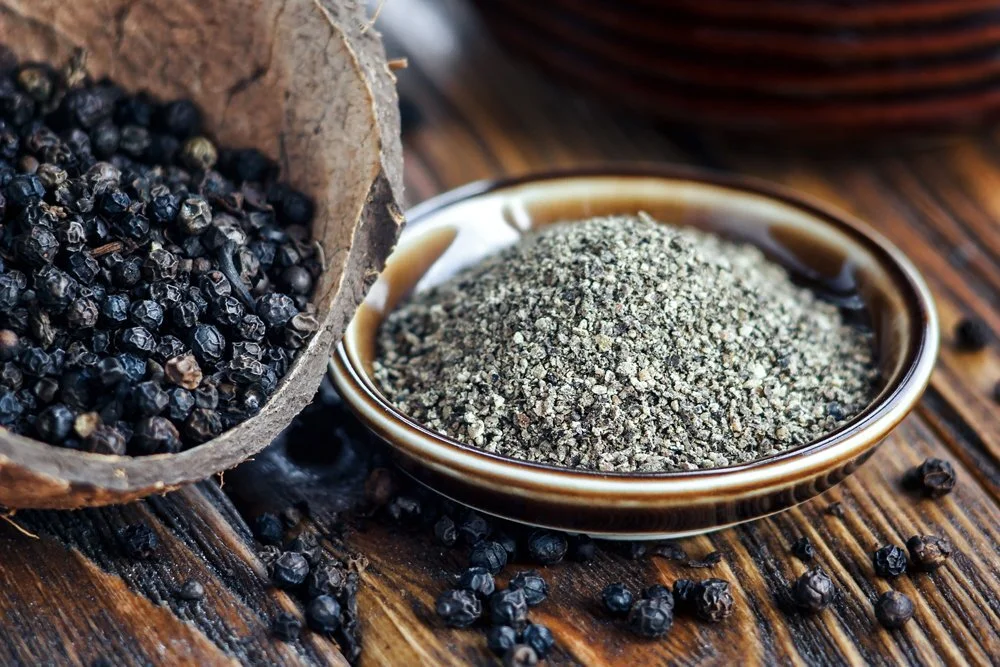5/19 Wednesday - What are the health benefits of Black Pepper?
BLACK PEPPER
Whatever it is, the way you tell your story online can make all the difference.
Reviewed on 9/17/2019
WHAT OTHER NAMES IS BLACK PEPPER KNOWN BY?
Black Peppercorn, Extrait de Poivre, Grain de Poivre, Hu Jiao, Kali Mirchi, Kosho, Marich, Maricha, Miris, Peber, Peper, Pepe, Peppar, Pepper, Pepper Extract, Peppercorn, Pfeffer, Pimenta, Pimienta, Pimienta Negra, Pipar, Piper, Piper nigrum, Piperine, Pippuri, Poivre, Poivre Noir, Poivrier, Schwarzer Pfeffer, Vellaja.
WHAT IS BLACK PEPPER?
Black pepper grows in India and other tropical Asian countries. Black pepper is one of the most commonly used spices in the world. Black pepper and white pepper both come from the same plant species. But they are prepared differently. Black pepper is made by cooking the dried unripe fruit. White pepper is made by cooking and drying the ripe seeds.
People take black pepper by mouth for arthritis, asthma, upset stomach, bronchitis, a bacterial infection that causes diarrhea (cholera), colic, depression, diarrhea, gas, headache, sex drive, menstrual pain, stuffy nose, sinus infection, dizziness, discolored skin (vitiligo), weight loss, and cancer.
People apply black pepper to the skin for measles, nerve pain, itchy skin caused by mites (scabies), and to treat pain.
People inhale black pepper oil to prevent falls, to help quit smoking, and for trouble swallowing.
In foods, black pepper and black pepper oil are used as spice.
INSUFFICIENT EVIDENCE TO RATE EFFECTIVENESS FOR...
Fall prevention. Early research shows that applying black pepper oil near the right side of the nose improves stability when the eyes are closed in older people. But it does not seem to improve stability better than lavender oil.
To help quit smoking. Early research shows that puffing on a vapor device using black pepper oil over 3 hours may reduce cigarette cravings and anxiety in men who smoke.
Trouble swallowing. Early research shows that applying black pepper oil to the nostrils or nasal cavity for one minute before meals improves swallowing in children with brain disorders who have been fed through a feeding tube for long periods of time. However, the black pepper oil did not eliminate the need for the feeding tube. Other early research shows that applying black pepper oil near the nostrils for one minute before meals improves swallowing movements in post-stroke residents at long-term care nursing homes.
A bacterial infection that causes diarrhea (cholera).
Arthritis.
Asthma.
Bronchitis.
Cancer.
Colic.
Depression.
Diarrhea..
Discolored skin (vitiligo).
Dizziness.
Gas.
Headache.
Itchy skin caused by mites (scabies).
Measles.
Menstrual pain.
Nerve pain.
Pain.
Sex drive.
Stuffy nose.
Sinus infection.
Upset stomach.
Weight loss.
Other conditions.
More evidence is needed to rate black pepper for these uses.
QUESTION
Next to red peppers, you can get the most vitamin C from ________________.See Answer
HOW DOES BLACK PEPPER WORK?
Black pepper contains a chemical called piperine. This chemical seems to have many effects in the body. It seems to reduce pain, improve breathing, and reduce inflammation. Piperine also seems to improve brain function, but it is not clear how.
ARE THERE SAFETY CONCERNS?
Black pepper is LIKELY SAFE when taken by mouth in amounts commonly found in foods.
Black pepper is POSSIBLY SAFE when taken by mouth appropriately as medicine and when the oil is applied to the skin. Black pepper oil typically does not cause side effects. Black pepper might have a burning aftertaste. Taking large amounts of black pepper by mouth, which can accidentally get into the lungs, has been reported to cause death. This is especially true in children.
Special Precautions & Warnings:
Pregnancy: Black pepper is LIKELY SAFE when taken by mouth in amounts commonly found in foods. It is LIKELY UNSAFE when taken by mouth in large amounts during pregnancy as it might cause an abortion.
There isn't enough reliable information available to know if applying black pepper to the skin is safe while pregnant.
Breast-feeding: Black pepper is LIKELY SAFE when taken by mouth in amounts commonly found in foods. There isn't enough reliable information available to know if taking black pepper as medicine is safe while breastfeeding.
Children: Black pepper is LIKELY SAFE when taken by mouth in amounts commonly found in foods. It is POSSIBLY UNSAFE when taken by mouth in large amounts as deaths have been reported. There isn't enough reliable information available to know if applying black pepper oil to the skin is safe for children.
Bleeding conditions: Piperine, a chemical in black pepper, might slow blood clotting. In theory, taking black pepper in amounts greater than those in food might increase the risk of bleeding in people with bleeding disorders.
Diabetes: Black pepper might affect blood sugar levels. In theory, taking black pepper in amounts greater than those in food might affect blood sugar control in people with diabetes. Dosing adjustments for diabetes medications might be needed.
Surgery: Piperine, a chemical in black pepper, might slow blood clotting and affect blood sugar levels. In theory, taking black pepper in amounts greater than those found in food might cause bleeding complications or affect blood sugar levels during surgery. You should stop taking black pepper in amounts greater than those in food at least 2 weeks before surgery.
DOSING CONSIDERATIONS FOR BLACK PEPPER.
The appropriate dose of black pepper depends on several factors such as the user's age, health, and several other conditions. At this time there is not enough scientific information to determine an appropriate range of doses for black pepper (in children/in adults). Keep in mind that natural products are not always necessarily safe and dosages can be important. Be sure to follow relevant directions on product labels and consult your pharmacist or physician or other healthcare professional before using.

